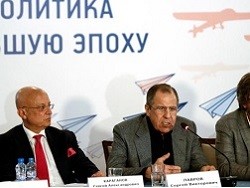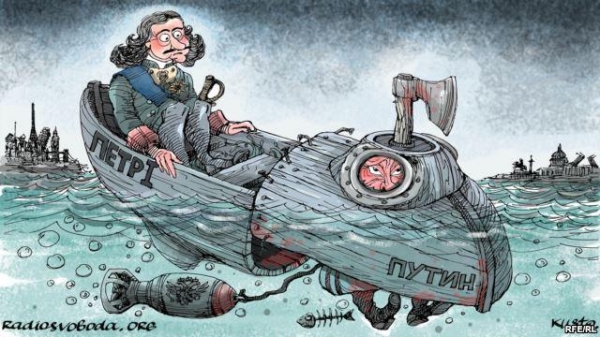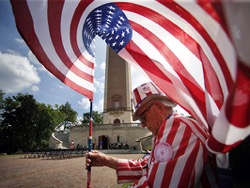
Why our country is changing the concept of foreign policy.
In the basis of the new concept of Russian foreign policy will be based on the transition to a “polycentric architecture” of international relations. This was stated by Russian foreign Minister Sergei Lavrov, speaking Saturday, April 9, at the meeting of the Council on foreign and defense policy, reports news Agency TASS.
“A period of uncertainty in world Affairs continues, — said the Minister. — To respond immediately, in one fell swoop all the questions, to invent some magical formula that will solve any problems, I am sure, impossible. This is even more true in the current international situation. It is a mosaic, contradictory”. This trend, as Lavrov explained, and will be reflected in the new wording of foreign policy concept, which is being developed on behalf of the President.
According to the head of the Russian foreign Ministry, we are talking about a prolonged period of transition to a polycentric architecture. “We don’t remove it from the agenda, on the contrary, we see numerous confirmations of this trend, he continued. — The shift to polycentric architecture should ideally be based on the interaction of leading powers in the interest of joint solution of global problems”.
But as far as possible in conditions of the become aggravated opposition in the international arena? Moreover, these goals are clearly at odds with the objectives and goals of the United States, which since the collapse of the USSR claiming to be a global hegemon and sole leader of the Western world.
So how do we build a new vector of foreign policy?
— Let me remind you that the concept in its present form was adopted just over three years ago — in February 2013, — commented the head of chair of international relations Diplomatic Academy of the MFA of the Russian Federation Boris Shmelev. But in new version this will be the fifth concept of the foreign policy during the existence of an independent Russia. And every time the concept adapts to changing international conditions of development of the country. In General, I can say that all these concepts have suffered from one defect, shortcoming — they were unrealistic. So they had to add, edit, eliminate contradictions between the realities of international life and what was in them written. But, I’m afraid, and a new concept for this sin, not get rid of.
“SP”: — Polycentrism involves the presence in the system of international relations of certain centers of power (States, units), which determine the development of world politics. In fact, it is all the same building a multipolar world. So what is changing?
— It is difficult to say what new moments will be included in the document that is being prepared now. And what does this formula — a “polycentric world”. The last twelve years we have appealed to the notion of “multipolar world”. And, frankly, I don’t see the fundamental difference. “Multipolar” or “polycentric world” is about the same.
Here more importantly. Russia’s foreign policy should not be resource intensive and must be subordinated to the interests of internal development of the country is the defining principle. Unfortunately, in recent years we have seen a departure from this principle. Russia’s foreign policy has become costly, resource-intensive is obvious. And it is not subordinated to the interests of domestic policy. And conversely, domestic politics forced to obey the interests of the external.
As for the so-called “multipolar world”, we all remember the bipolar era of the cold war, when all system defined relationship between the USSR and the USA.
After the collapse of the Soviet Union began a new system of international relations. And here for a long time, indeed, dominated by the United States. But now their role would be reduced, and the arena of international politics there are new strong players.
First of all, this is China. It’s Russia. And in the future is likely to claim even India.
But if we talk about today, in fact the only centre of world politics, the connecting factor of the entire system of international relations is the United States. The EU supports the USA and from an independent geopolitical role in international relations declined.
“SP”: — And China?
— China is a superpower from the point of view of its economic power. Because China’s GDP by all accounts today already slightly exceeds the U.S. GDP. But China does not assume responsibility for the maintenance of international security. He acts solely for his own benefit. And China’s foreign policy is not resource intensive and are not resursozatratno. Subservient to interests of domestic policy.
To say that India became the centre of world politics, it’s still early. It is a matter of the distant future. And while it is a regional power. But that this might be the BRICS, however. It’s not an organization, not a structure. This is a forum, an Association of several major powers, which, to put it bluntly, there is no common view, a common approach to world Affairs.
“SP”: — Where we seek allies for building a multipolar world?
— It is clear that Russia is not satisfied with its allotted space and wants to take another position in the world. And rebuild this whole world order and its interests.
But first (and this, by the way, said our President) — Russia does not claim the role of superpower. And cannot be a superpower with its economic parameters.
Secondly, Russia itself is not clearly defined — and what she wants in this system of international relations? The main problem of Russia, its international position and economic weakness. She freezes in its foreign policy, to the extent there is a powerful economic support in the form of a strong economy.
Yes, we can achieve some tactical success, as now in Syria. But strategically there is nothing we will not have. The same can be said about other areas of foreign policy.
“SP”: — What, for example?
— Those that we call post-Soviet space. For Russia — which is understandable — it is a zone of special interests. But now there is brewing a very complex process. And all our attempts to keep the situation under control and to preserve the status quo, I’m afraid, generally, probably success will not have.
Here we have a Karabakh conflict: keep — kept, and flushed suddenly. Now a very complicated situation in Central Asia. It is unclear what to do with Transnistria. The most complicated situation in Ukraine and relations with Ukraine. The problems with Moldova.
We have a very ambiguous relationship, even within the narrow circle of allies in the post-Soviet space. Besides Nagorno-Karabakh, Kazakhstan’s attitude to, say, other than against Russia. Because Kazakhstan supports in the first place Azerbaijan in this conflict. Not Armenia, its ally in the CSTO. Very difficult situation in the relations between Kyrgyzstan and Uzbekistan. Between Uzbekistan and Tajikistan. Difficulties arise in our relations with Belarus. It is connected with economic processes in Belarus and economic processes in Russia itself.
Therefore, if we talk about whether our allies so that we could create a “power center” and play a more significant role in international relations, allies. China is not an ally. This is our partner. Strategic, important, but the partner.
We will be with the PRC military-political Alliance or not, this issue is very important. And most likely, probably not. Although in international Affairs turns can be unexpected.
Meanwhile the position of Russia in international Affairs is rather difficult. And in these circumstances we must be extremely careful. Very reserved. And have to adjust their political ambitions with their internal resources.
“SP”: — Explain that?
— The main efforts should be now directed on the solution of our domestic problems. You know, in 1922, Vladimir Lenin asked: “How Soviet Russia can exert its influence on the course of world history?” And here’s what he said: “Russia can exert its influence for its economic success”.
This formula has not lost its importance and at the present time. But economic success was achieved very little.
“SP”: — And in conditions when our country on all sides have imposed sanctions, economic success even possible?
— Certainly possible. Because Russia has enormous resources. The gigantic intellectual potential. We have financial resources. There are opportunities to develop quickly. All depends on literate, the right policy. No.
All the problems of today’s Russia are associated not with the sanctions, and with the policy pursued by our government. Even the collapse of the ruble is not so much a consequence of the world situation as the consequence of the policies pursued.
Of course, politics is so arranged that either you play, either “play” you. Russia as a great power, she cannot passively look at what is happening in the world, can not participate in building a new world order with due account of their interests is quite obvious. But it needs to be very careful. And all your steps and all your actions to subordinate the interests of internal development, so as not to repeat the fate of the USSR.
Why China over the last thirty years has evolved from a global village into a superpower? And why Gorbachev’s time treading water? We have at least one problem was solved within the country? We, by and large, solved nothing.
Meanwhile, the problems of multipolarity or polycentricity is a problem that primarily rests in the development of the country. In the development of its economy. If you are not able to solve this problem, you can’t pretend to be any significant center of power.
The President of “Institute of national strategy,” political scientist Mikhail Remizov has reminded that the updating of the strategy of foreign policy takes place at regular intervals.
Actually it is an ongoing process. And the fact that in this case adjustments had to be made before the deadline, can be explained by the events that have occurred in recent years. This is a coup and civil war in Ukraine. This event in the middle East and Russia’s new role in these events.
Indeed, over the past three years and our role in the world, and the world around are perceived differently. And, accordingly, it makes sense to include it in the documents, shall we say, strategic planning. While our diplomacy all the time emphasizes that we continue to pursue the same course. And the events it in no way changed, but only confirm. So I think that the changes will not be wearing some of a radical nature.
Although this thesis is debatable. I mean the fact that our actions in Syria and Crimea, and the situation in relations between Russia and the West, largely open to a certain extent, a new era in international relations. Her we have yet to comprehend.








